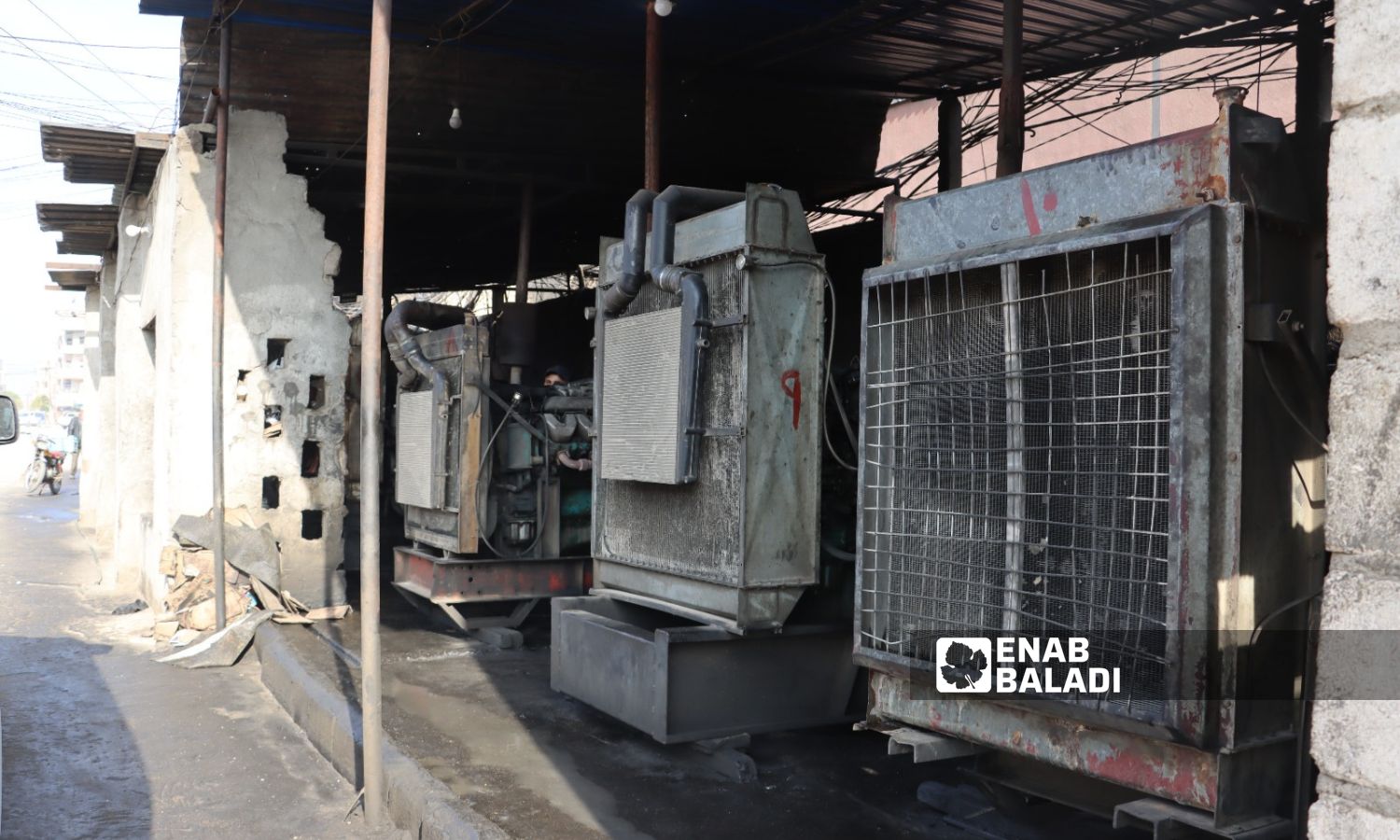



Some power generators that supply the ampere system in al-Hasakah province and its affiliated cities and towns have ceased to operate due to the failure of the Autonomous Administration’s Fuel Committee to deliver diesel allocations, exacerbating residents’ problems amidst a heatwave hitting the province.
Enab Baladi’s correspondent in al-Hasakah reported an electricity crisis in parts of the province due to the generators stopping operations for about a week.
Mohammad al-Khairi, owner of an ampere generator in Qamishli city, north of al-Hasakah, told Enab Baladi that he used to get subsidized diesel at a price of 2,350 Syrian pounds per liter, with the last batch received about seven days ago.
When he approached to receive a new batch, the Fuel Committee informed him that he would not receive enough allocations to operate the generator for eight hours as before, but only enough for six hours, despite no official decision being issued regarding the change in allocations.
Al-Khairi added that the Fuel Committee employee asked him to check back after five days for the allocations, which forced him to stop his generator completely as he could not afford to buy diesel at the unsubsidized price of 4,600 Syrian pounds per liter.
He mentioned that the high temperatures in summer lead to frequent generator malfunctions, necessitating stopping for cooling and repairs at times.
At the time of reporting, the temperature in al-Hasakah province was 42 degrees Celsius, according to the weather monitoring site “The Weather Channel,” and is not expected to drop below 40 degrees during the current week.
Residents of northeastern Syria rely on ampere generators to meet their energy needs. The area has three types of subscription systems for these generators: operating eight hours a day, 16 hours, and a full-day service.
Sarah Hassou from the Corniche neighborhood told Enab Baladi that she had to sell a gold ring she owned a month ago to afford the subscription cost for a 24-hour ampere generator because she has two six-month-old children at home, who could not withstand the summer heat.
Mid-last week, Hassou was surprised by frequent power outages, noting that previously, the power would only be cut off for half an hour or an hour daily in case of breakdowns. Currently, the generator operates for less than 18 hours even though she pays for a 24-hour subscription, costing seven dollars per ampere, approximately 106,000 Syrian pounds.
The exchange rate of the Syrian pound stood at 14,800 against the US dollar according to the currency tracking site, the S-P Today.
Enab Baladi contacted the Fuel Committee and generator owners in the city but received no response by the time this report was published. The Autonomous Administration has not issued any decision regarding the generators, leaving their owners in control of their operation amid the current high temperatures.
Siwar Abdel Hai, managing a 24-hour ampere generator in al-Hasakah city, told Enab Baladi that the generator relies on subsidized diesel provided by the Autonomous Administration, sufficient for operating the generator for only eight hours.
He added that generator owners resort to buying diesel at 4,600 Syrian pounds per liter to cover additional operational hours, in addition to bearing transportation costs of up to 30 pounds per liter.
According to Abdel Hai, generator owners have not received any allocations for more than ten days, forcing them to reduce the operating hours of the generators.
A Fuel Committee employee told Abdel Hai that the subsidized diesel, previously sold at 2,350 Syrian pounds per liter, would no longer be distributed to facilities such as cafes, restaurants, pools, storage refrigerators, and brick factories. The committee is currently focusing on meeting the needs of bakeries, mills, farmers, and subscription generators, Abdel Hai told Enab Baladi.
In addition to amperes, some residents resort to installing solar panels, the costs of which are not low compared to other energy options.
Though both amperes and solar panels are considered alternative solutions, their high costs and residents’ low purchasing power hinder subscriptions.
if you think the article contain wrong information or you have additional details Send Correction